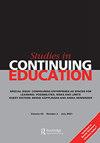学校不是一个学习环境:语言对教育实践的实践研究如何重要
IF 1.9
4区 教育学
Q2 EDUCATION & EDUCATIONAL RESEARCH
引用次数: 0
摘要
摘要在“建筑空间如何影响教育工作者的工作实践:通过实践视角的检验”特刊的特邀评论中,我讨论了实践建筑理论和实践本体论的见解如何有助于探索教育实践的复杂性,特别是关于发生这种做法的地点。通过关注这些实践中发生的行为、言论和关系以及它们的物质条件,这些贡献为理解教育实践增加了许多细微之处和细节,尤其是当这些实践由于往往超出这些实践参与者自身影响的力量而处于“过渡期”时。我提出的主要批评点是作者自己使用的语录。我认为,在研究教育实践时,提及“学习”是有问题的。我特别提出了将学校、学院和大学视为“学习环境”的想法我提供了为什么这种参与教育实践的方式存在问题的原因——无论是从研究角度还是从实践和政策角度——并建议更好的指定是将其视为教育实践。本文章由计算机程序翻译,如有差异,请以英文原文为准。
The school is not a learning environment: how language matters for the practical study of educational practices
ABSTRACT In this invited commentary for the special issue on ‘How built spaces influence practices of educators’ work: An examination through practice lens,’ I discuss how insights from the theory of practice architecture and the theory of practice ontology are helpful in exploring the complexities of educational practices, particularly with reference to the locations within and through which such practices take place. By focusing on the doings, sayings and relatings that take place in such practices and on their material conditions, the contributions add much nuance and detail to the understanding of educational practices, particularly when such practices are ‘in transition’ due to forces that are often beyond the influence of the actors in such practices themselves. The main critical point I make concerns the sayings utilised by the authors themselves. I suggest that references to ‘learning’ are problematic in the study of educational practices. I single out the idea of seeing schools, colleges and universities as ‘learning environments.’ I provide reasons why this way of engaging with educational practices is problematic – both from a research perspective and from a practice and policy perspective – and suggest that the better designation would be that of seeing them as educational practices.
求助全文
通过发布文献求助,成功后即可免费获取论文全文。
去求助
来源期刊

Studies in Continuing Education
EDUCATION & EDUCATIONAL RESEARCH-
CiteScore
4.70
自引率
6.70%
发文量
22
期刊介绍:
Studies in Continuing Education is a scholarly journal concerned with all aspects of continuing, professional and lifelong learning. It aims to be of special interest to those involved in: •continuing professional education •adults learning •staff development •training and development •human resource development
 求助内容:
求助内容: 应助结果提醒方式:
应助结果提醒方式:


